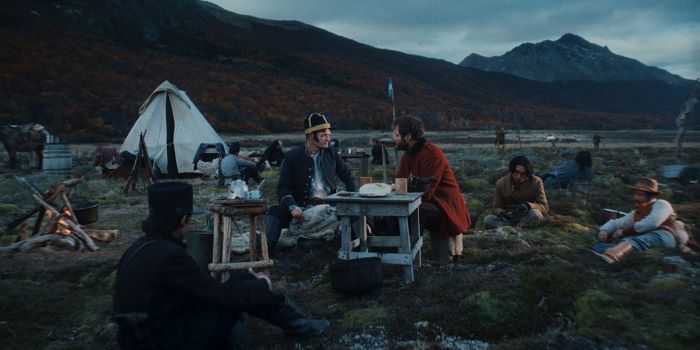The New York Film Festival counts as a safe haven: Each selected film garners the same initial consideration without the intrusion of external circumstances questioning its commercial profitability or ultimate destiny. (Will such-and-such film be released in theaters? For how long? Will it be buried on a streaming service, hardly noticed?) Especially in the case of South American cinema—which often seems to have limited success unless it cultivates tremendous hype beyond its borders—it’s refreshing that filmmakers have a showcase here.
A light but deliciously funny offering this year was the Argentinian comedy La Práctica, set in Chile and directed by Martín Rejtman. Gustavo (Esteban Bigliardi, who also starred in The Delinquents, also at the festival) is an Argentinian yoga instructor experiencing a midlife crisis. He is in the midst of a divorce with his Chilean wife, who is also a yoga instructor, so he’s living with his in-laws as a result. Meanwhile, he doesn’t feel prepared to return to his homeland after so many years away, despite his mother’s insistence (played by a hilarious Mirta Busnelli). His professional life is also far from a bed of roses: A student suffers temporary amnesia after an accident during a class, and a new pupil steals personal belongings from the other students. Even worse, a torn meniscus keeps Gustavo from practicing his livelihood. This is the kind of comedy where everything that can go wrong will, indeed, get worse.
La Práctica revels in the foolishness of an obtuse man who resists any form of change (including Gustavo’s participating in couple’s therapy while getting a divorce). However, the film is much more enjoyable when the portrait expands to become a group mosaic featuring other characters and their mundane dramas. Although the jokes may seem very local, the humor works universally as a knowing nod for anyone who has felt the repercussions of the passage of time on the body and soul.
Meanwhile, the unclassifiable and adventurous Eureka by Lisandro Alonso combines genres and symbolism to become a mystifying cinephile game. It could not be a more radically different selection. The Argentinian director superimposes stories from different times, geographies (from South Dakota to the jungles of Brazil), and languages to address colonialism of the past and its repercussions for Indigenous inhabitants in modern times.
With a playful episodic structure, Alonso trusts audiences to connect dots between invisible threads and common themes, from a brief, stylized black-and-white western prologue starring Viggo Mortensen to a documentary-like portrayal of a Native American female police officer in South Dakota—this is the most engaging section, thanks to this protagonist. Changes in tone and time periods will follow, almost arbitrarily, unless you embrace Eureka as a meditation on the history of survival and adaptation. A final act focuses on Indigenous men hired as plunderers of the gold that once belonged entirely to their ancestors.
In a way, Lisandro’s latest work takes advantage of its “festival fare” status: screening in venues that don’t rely on an audience with mainstream expectations. The experience itself can be a bit frustrating; the film is more concerned with maintaining a mysterious iconography to create a kind of dream journal that embraces historical and social concerns without lessening its tendentious opacity.
Finally, the Chilean film The Settlers provides greater historical clarity and political conviction as a critique of colonialism. At the same time, its journey through festivals this year, since its Cannes premiere, allows it to establish a spiritual link not only with Alonso’s film but also with Martin Scorsese’s recent Killers of the Flower Moon. Each director’s contribution deals with different degrees of guilty reflections regarding the crimes and unpayable debts of the West against Native populations.
The film introduces director Felipe Gálvez as a talent to keep an eye on. His first feature film discloses a dark history of violence and injustice in a country that, since its foundation, has treated its first inhabitants with cruelty. Its brilliant epilogue highlights how well-intentioned attempts at reparations are usually just a form of delusion that perpetuates the inequality between colonizers and colonized, even centuries later.
In 1901, a British officer lying about his military rank (Mark Stanley); a trigger-happy American gunslinger named Bill (Benjamin Westfall); and Segundo (Camilo Arancibia), an almost always silent mestizo, must obey the orders of a Chilean landowner to demarcate and claim lands that extend to the border with Argentina. Segundo becomes a witness to the pair of psychopaths accompanying him, and the moral center by default. The portrayal of oppression and barbarism in the name of the Chilean government creates a complex dynamic between the three men, who need each other to navigate the potential dangers ahead (Indigenous tribes, other soldiers and mercenaries, any sudden betrayal among themselves). In a gut-wrenching scene, the men pressure Segundo to be next in line to rape a dying Indian woman. He knows that any refusal on his part will put his own life at risk.
Who could have anticipated that the most fiery and impactful revitalization the western genre has received in years would come in the form of a Chilean period piece about a horseback expedition of mercenaries riding across Tierra del Fuego? A film loaded with visceral violence and representations of rampant racism, The Settlers does not become an impossible-to-watch experience, in part to Simone D’Arcangelo’s standout cinematography—each painterly composition leaves you breathless.
Gálvez’s debut is one of the best Latin American films of 2023. Not to be missed.
The Settlers will open in U.S. theaters on January 12, 2024.


















Leave A Comment